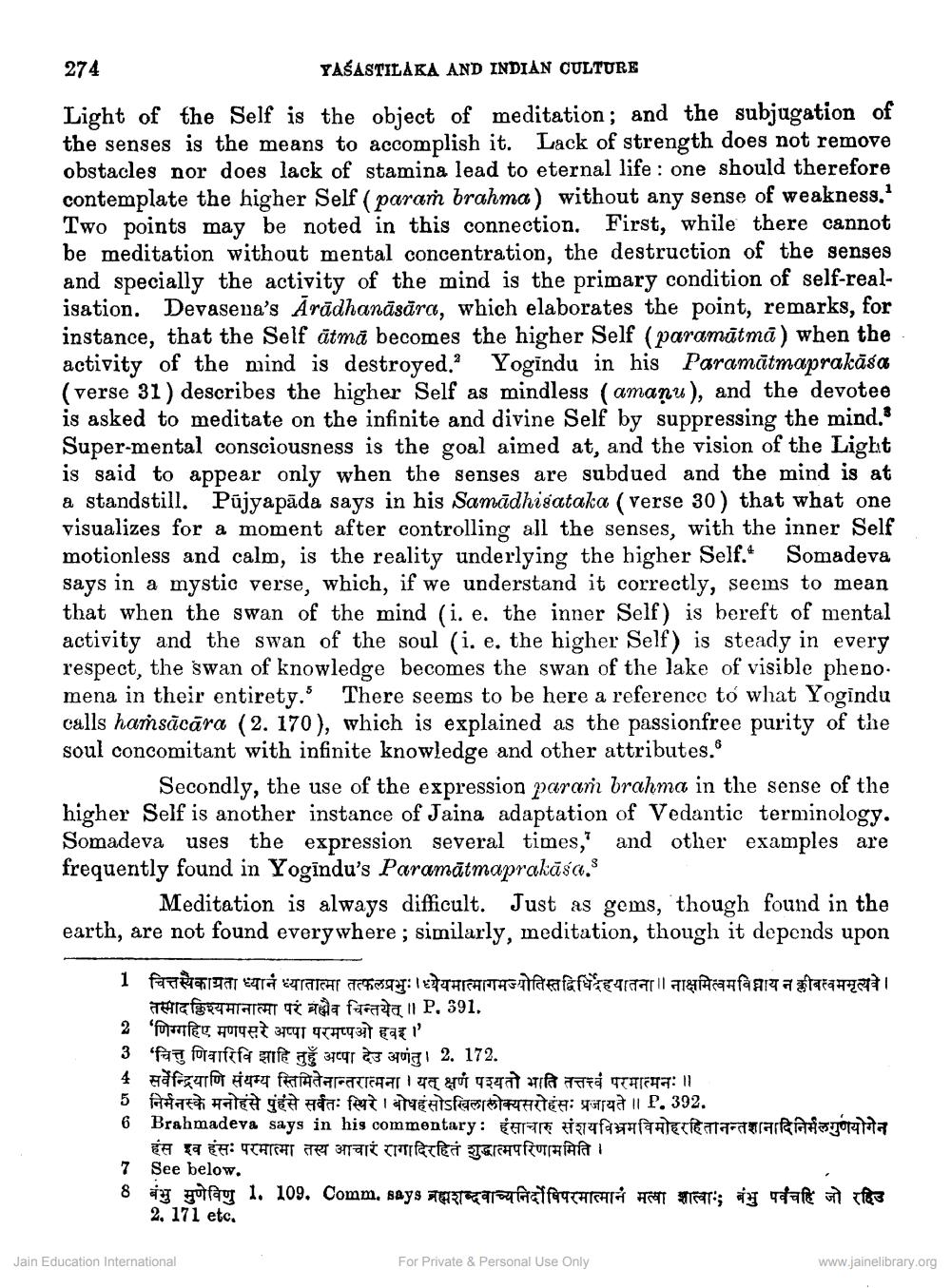________________
274
YAŠASTILAKA AND INDIAN CULTURE Light of the Self is the object of meditation; and the subjugation of the senses is the means to accomplish it. Lack of strength does not remove obstacles nor does lack of stamina lead to eternal life : one should therefore contemplate the higher Self ( paraṁ brahma) without any sense of weakness." Two points may be noted in this connection. First, while there cannot be meditation without mental concentration, the destruction of the senses
ally the activity of the mind is the primary condition of self-realisation. Devasena's Ārādhanāsāra, which elaborates the point, remarks, for instance, that the Self ātmā becomes the higher Self (paramātmā) when the activity of the mind is destroyed. Yogindu in his Paramātmaprakāša (verse 31) describes the higher Self as mindless amanu), and the devotee is asked to meditate on the infinite and divine Self by suppressing the mind." Super-mental consciousness is the goal aimed at, and the vision of the Light is said to appear only when the senses are subdued and the mind is at a standstill. Pūjyapāda says in his Samadhigataka (verse 30 ) that what one visualizes for a moment after controlling all the senses, with the inner Self motionless and calm, is the reality underlying the higher Self. Somadeva says in a mystic verse, which, if we understand it correctly, seems to mean that when the swan of the mind (i. e. the inner Self) is bereft of mental activity and the swan of the soul (i, e. the higher Self) is steady in every respect, the swan of knowledge becomes the swan of the lake of visible pheno. mena in their entirety. There seems to be here a reference to what Yogindu calls haṁsācāra (2. 170), which is explained as the passionfree purity of the soul concomitant with infinite knowledge and other attributes.
Secondly, the use of the expression param brahma in the sense of the higher Self is another instance of Jaina adaptation of Vedantic terminology. Somadeva uses the expression several times, and other examples are frequently found in Yogindu's Paramātmaprakāśa.
Meditation is always difficult. Just as gems, though found in the earth, are not found everywhere; similarly, meditation, though it depends upon
1 चित्तस्यैकाग्रता ध्यानं ध्यातात्मा तत्फलप्रभुः।ध्येयमात्मागमज्योतिस्तद्विदिहयातना।। नाक्षमित्वमविघ्नाय न क्लीबत्वममृत्यवे ।
TATE PRETARISHT TË Rea fatada 11 P. 391. 2 foto forget 31 4547347 CAT 3 for foarfifa ilt að 370 g Bruia 2. 172. 4 सन्द्रियाणि संयम्य स्तिमितेनान्तरात्मना । यत् क्षणं पश्यतो भाति तत्तत्त्वं परमात्मनः॥ 5 ART HIEĦ ga ada: feriachtsfaltaTHÉA: wara li P. 392. 6 Brahmadeva says in his commentary: हंसाचार संशयविभ्रमविमोहरहितानन्तशानादि निर्मलगुणयोगेन
हंस इव हंसः परमात्मा तस्य आचारं रागादिरहितं शुद्धात्मपरिणाममिति । 7 See below. 8 ay gufag i. 109. Comm. says te falfoqchi RHT Frat; at af The
2. 171 etc.
Jain Education International
For Private & Personal Use Only
www.jainelibrary.org




